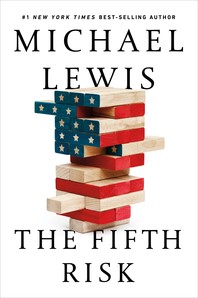
 In the Fifth Risk, Michael Lewis gives an inside account of the troubled transition from the Obama to the Trump White House and the new administration’s seemingly wilful ignorance of the federal bureaucracy. Rubrick Biegon and Tom Watts praise the book for its accessibility and discussion of the longer term risks that the Trump presidency may pose to American prosperity, security, and wellbeing.
In the Fifth Risk, Michael Lewis gives an inside account of the troubled transition from the Obama to the Trump White House and the new administration’s seemingly wilful ignorance of the federal bureaucracy. Rubrick Biegon and Tom Watts praise the book for its accessibility and discussion of the longer term risks that the Trump presidency may pose to American prosperity, security, and wellbeing.
 The Fifth Risk. Michael Lewis. Allen Lane. October 2018.
The Fifth Risk. Michael Lewis. Allen Lane. October 2018.
At its core, The Fifth Risk is a celebration of the often nameless civil servants that staff the American federal government that simultaneously shines light on the longer term risks to American society generated by Donald Trump’s chaotic transition. The book is written by Michael Lewis, the author of the data-driven bestsellers Moneyball and The Big Short and a former MA student in economics at the LSE. As you would expect from an ‘International Bestselling Author’, as advertised on the book’s cover sleeve, this is a well-written and accessible text.
More than that however, The Fifth Risk is an examination of three core themes which are relevant to understanding contemporary American politics and society. These are: the bungled and chaotic transition between the Obama and Trump administrations; the tension between the American public’s declining trust in the federal government and the need for federal agencies to manage the complex portfolio of ‘risks’ which private interests don’t have the capacity to manage, and; the longer-term and as yet unknowable ‘risks’ which Trump’s presidency presents to American prosperity, security, and wellbeing.
The book’s prologue examines Trump’s shambolic presidential ahead of his January 2017 inauguration. So unprepared was Trump for the realities of governing that adviser Steve Bannon reportedly stated Trump not only ‘doesn’t know anything’, but that he ‘doesn’t give a shit’ about his lack of knowledge (30). As Lewis discusses, spanning a narrative arc that begins during the Republican primaries, Trump unceremoniously fired his entire transition team the day after his unexpected election victory. Whilst this terrain has been covered elsewhere, Lewis is nevertheless able to provide new insights. This includes, for example, the president-elect’s willingness to accept a call from the Egyptian president because ‘Trump was like…I love the Bangles! You know that song “Walk Like an Egyptian?”’ (27).
The remainder of The Fifth Risk chronicles the Trump administration’s ‘willful ignorance’ (75) of the workings and importance of the federal bureaucracy. Weaving through a series of detailed vignettes of civil servants whom Lewis praises for their creativity and dedication, the book’s three main chapters examine the Departments of Energy, Agriculture, and Commerce respectively. According to Lewis, we can look to the pervasive ‘Trumpian impulse—the desire not to know’ (75) for an explanation of why the administration has failed to properly engage with and staff these departments. In this respect, the book complements recent insider accounts which have highlighted the chaos and confusion in the White House, from Michael Woolf’s Fire and Fury to Bob Woodword’s Fear. Beyond that, it also serves as a sympathetic (and timely) defence of a federal bureaucracy imperilled by a suspicious administration.
By DrRandomFactor (Own work) [CC BY-SA 3.0], via Wikimedia Commons
Akin to Donald Rumsfeld’s cryptic ‘unknowns’, the titular ‘Fifth Risk’ speaks to the unforeseen dangers which Lewis sees as emerging from Trump’s prioritization of short-term gains (often to the advantage of narrow sectional interests) over a careful management of longer-term political and ecological challenges. This includes ‘the existential threat that you never really even imagine as a risk’ (73) and the ‘innovation that never occurs, and the knowledge that is never created, because you have ceased to lay the ground for it’ (74). Given Lewis’s audience, which lies beyond the Washington DC ‘beltway’ and squarely within mainstream Middle America, the book is a welcome tribute to federal programs and the public goods they produce, many of which are drastically underappreciated for their role in fortifying the United States against hidden and emergent risks.
Like much of the contemporary journalistic commentary on the Trump phenomenon, however, The Fifth Risk underplays the relatively coherent political agenda structuring how Trump governs—an agenda that predates the current occupant of 1600 Pennsylvania Avenue. Trump’s first two years in office have produced a series of outcomes that are perfectly consistent with the longstanding aims of the national Republican Party and its donor base: the Supreme Court appointments of Gorsuch and Kavanaugh, both backed by the conservative Federalist Society; tax legislation favouring the wealthy; and a deregulatory push to undue the financial reforms of the Obama era.
At times, Lewis’s account sheds light on the deeper dynamics hollowing out the federal bureaucracy. The choice of Barry Myers, head of private weather firm AccuWeather, to lead the National Oceanic and Atmospheric Administration (NOAA, a scientific agency within the Department of Commerce) is both striking and predictable. Acknowledging that Mills’ appointment represents an attempt to effectively ‘dismantle’ NOAA through privatisation, Lewis writes that ‘the private weather industry, unlike the (government-based) National Weather Service, has a financial interest in catastrophe’ (172). The ‘dystopic endgame’ Lewis senses with weather forecasting can be extended to a host of other issues and risks, from nuclear waste to food security.
In Lewis’s narrative, as noted by one reviewer, ‘the Trump administration seems eager not only to curtail the scope of government but to permanently diminish its capabilities and expertise’. The same could have been said about previous GOP administrations from Ronald Reagan onwards, even if the bizarre cast of characters Trump has brought to the center of government throws the current bout of ‘willful ignorance’ into sharper contrast. Just as the obsession with Trump’s idiosyncrasies can serve to depoliticize his project, the focus on the administration’s ignorance can obscure the interests and ideology motivating Trump’s personnel and policy decisions. Whilst offering a well-researched and accessible account of the recent transition, Lewis at times misses the woods through the trees. Arguably, the processes which can help us better explain how the administration has chosen to staff these key agencies, the effective ‘enclosure’ of once publicly held data and the gutting of departmental budgets, began in the 1980s with the ascendancy of neoliberalism. Trump, in other words, represents an escalation of pre-existing trends, if a departure in terms of style and rhetoric.
Overall, The Fifth Risk is well worth a read. It sheds new light on Trump’s chaotic transition and the mismanagement of several core federal agencies. That said, however, whilst there is much that is novel about the Trump presidency, his administration’s fundamental approach to government is not new, and, unfortunately, cannot be attributed solely to naiveté or the absurdities of Trump’s character.
Please read our comments policy before commenting.
Note: This article gives the views of the authors, and not the position of USAPP– American Politics and Policy, nor of the London School of Economics.
Shortened URL for this post: http://bit.ly/2BeSk6Y
About the reviewers
 Rubrick Biegon – University of Kent
Rubrick Biegon – University of Kent
Rubrick is a Lecturer in International Relations at the University of Kent. His research interests include U.S. foreign policy, international security, and international political economy. He is the author of U.S. Power in Latin America: Renewing Hegemony (2017).
 Tom Watts – Royal Holloway University
Tom Watts – Royal Holloway University
Tom is Teaching Fellow in War and Security at Royal Holloway University. He has just submitted his PhD in International Relations at the University of Kent which critically re-examined the means and animators of the Obama administration’s military response to al-Qaeda’s regional affiliates. Tom’s research interests lay at the intersection of U.S. train-and-equip programs, remote practices of warfare, and lethal autonomous weapons systems.




